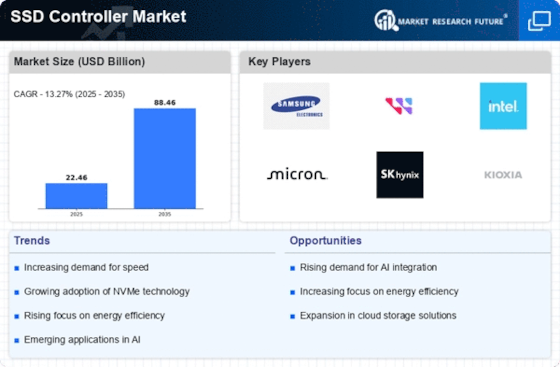Top Industry Leaders in the SSD Controller Market

The Competitive Landscape of the SSD Controller Market
The SSD controller market, the brains behind solid-state drives, pulsates with innovation and fierce competition. Understanding the landscape is crucial for navigating the complex dynamics and making informed decisions. Let's delve into the key players, their strategies, market share factors, and emerging trends that shape this vibrant market.
Key Player:
- Marvell Technology Group
- Samsung
- Intel
- Toshiba
- Western Digital
- Micron Technology Inc.
- NetApp
- IBM
- Phison Electronics Corporation
- Silicon Motion Technology Corporation
- SandForce
Strategies Adopted by Key Players:
- InnoGrit Corp.: This Chinese fabless semiconductor company focuses on high-performance PCIe Gen4 and Gen5 controllers for the enterprise and data center markets. Their competitive pricing and strong partnerships with memory manufacturers position them as a potential disruptor.
- MaxLinear, Inc.: A leading provider of mixed-signal integrated circuits, MaxLinear entered the SSD controller market with their acquisition of Quantenna Communications in 2021. Their expertise in high-speed connectivity solutions and focus on NVMe-oF (NVMe over Fabrics) controllers present a unique value proposition.
- Efinix, Inc.: Known for their programmable logic devices, Efinix has ventured into the SSD controller market with their Trion series of controllers. Their focus on customization and flexibility caters to specific niche applications and offers an alternative to traditional fixed-function controllers.
Factors Shaping Market Share:
- Technological Innovation: The ability to develop advanced controllers that support emerging memory technologies like QLC NAND and CXL (Compute Express Link) is a key differentiator. Players who can offer high-performance, low-power, and secure controllers will gain an edge.
- Strategic Partnerships: Collaborations with NAND flash manufacturers and system integrators can provide access to cutting-edge technology and broader market reach. This is crucial for smaller players to compete with established giants.
- Cost-Effectiveness: Balancing performance and affordability is essential, especially in budget-conscious segments. Players who can offer controllers with optimal price-performance ratios will attract wider customer adoption.
Emerging Trends and Opportunities:
- PCIe Gen 5 and CXL Adoption: The shift towards faster PCIe interfaces and CXL interconnect technology for data centers presents new opportunities for high-performance controllers. Players who can adapt quickly will benefit from the growing demand for efficient data storage solutions.
- AI-powered Flash Management: Integrating AI into flash management algorithms can optimize performance, endurance, and data security. Players who can leverage AI effectively will gain a competitive advantage in the high-end enterprise storage market.
- Edge Computing and IoT Applications: The rise of edge computing and the Internet of Things (IoT) creates a demand for compact, low-power SSD controllers for embedded devices. Players who can cater to these specialized needs will tap into a rapidly expanding market.
Latest Company Updates:
Samsung
- October 2023: Samsung unveiled the industry's first PCIe Gen 5 SSD controller, the Samsung PCIe Gen 5 NVMe SSD controller (model name undisclosed), capable of delivering 14,000 MB/s sequential read and 12,000 MB/s sequential write speeds. This controller is expected to drive the adoption of PCIe Gen 5 SSDs in high-performance computing, enterprise storage, and AI/ML workloads.
- September 2023: Samsung introduced the Samsung PM9C1a, a PCIe Gen 4 NVMe SSD controller designed for data centers and enterprise applications. It offers up to 7,400 MB/s sequential read and 3,400 MB/s sequential write speeds, along with advanced features like end-to-end data path protection and power loss protection.
Intel
- November 2023: Intel announced the Intel SSD DC P5500, a PCIe Gen 4 NVMe SSD designed for data centers and enterprise applications. It offers up to 7,100 MB/s sequential read and 3,200 MB/s sequential write speeds, along with advanced features like Intel Optane persistent memory and Intel QuickAssist Technology.
- October 2023: Intel introduced the Intel SSD 670p, a PCIe Gen 3 NVMe SSD designed for mainstream PCs and laptops. It offers up to 3,500 MB/s sequential read and 2,900 MB/s sequential write speeds, making it a significant performance upgrade over SATA-based SSDs.









